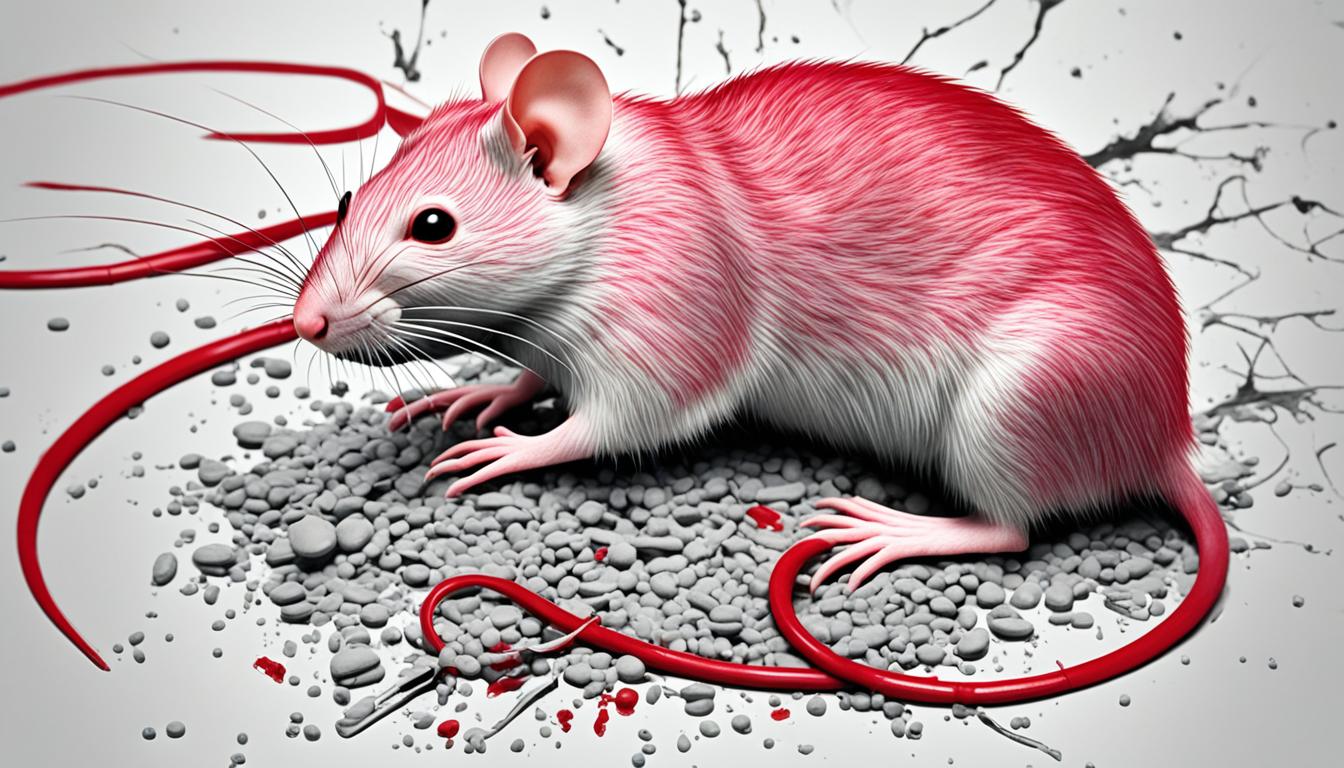Rat poisoning refers to the ingestion of substances designed to eliminate rodents but inadvertently affecting other animals, including humans. Understanding the symptoms of rat poisoning is crucial for timely intervention and medical care.
Key Takeaways:
- Rat poisoning can have serious health effects on humans.
- Common symptoms include nausea, vomiting, diarrhea, abdominal pain, loss of appetite, weakness, muscle tremors, seizures, rashes, headaches, dizziness, confusion, and unusual behavior.
- Prompt medical attention is necessary if you experience any of these symptoms.
- Rat poisoning can cause liver damage, kidney complications, respiratory failure, anemia, and low blood pressure.
- Seek professional medical evaluation and treatment in cases of suspected rat poisoning to ensure the best possible outcome for your health.
Nausea and Vomiting
In the initial stages of rat poisoning, patients may experience persistent nausea and frequent vomiting. These symptoms are the body’s immediate response to ingesting toxic substances commonly found in rat poison. The aim is to expel harmful elements causing digestive distress. Prompt medical intervention is necessary if these symptoms occur.
Rat poison, often used to control rodent populations, contains potent ingredients that can have serious health consequences when accidentally ingested by humans. The toxic components of rat poison can cause various symptoms, including gastrointestinal upset such as nausea and vomiting.
When a person ingests rat poison, the body recognizes the presence of harmful substances and triggers a natural defense mechanism. Nausea occurs as the body attempts to rid itself of the toxic chemicals through vomiting. This response is an essential protective measure to prevent further absorption and spread of toxins.
It is crucial to understand that rat poison bait can have different compositions, with specific chemical agents causing these adverse effects. The symptoms of nausea and vomiting can vary depending on the type and quantity of rat poison ingested.
If a person experiences persistent nausea or frequent vomiting after potential exposure to rat poison, it is important to seek immediate medical attention. Medical professionals are equipped to assess the severity of symptoms, determine the type of rat poison ingested, and administer appropriate treatment.
Additionally, prompt medical intervention can help prevent potential complications associated with rat poison ingestion. Poison bait side effects can range from mild discomfort to life-threatening situations, highlighting the importance of professional assessment and management.
Remember, it is always better to err on the side of caution when it comes to potential rat poison ingestion. Seek medical attention promptly if you or someone you know experiences nausea and vomiting after potential exposure to rat poison.
| Poison Bait Type | Nausea Severity | Vomiting Frequency |
|---|---|---|
| Bromethalin-Based | Moderate to Severe | Frequent |
| Anticoagulant (Warfarin-Based) | Mild to Moderate | Intermittent |
| Cholecalciferol (Vitamin D3) | Moderate to Severe | Frequent |
| Zinc Phosphide | Moderate to Severe | Frequent |
Diarrhea
One of the common symptoms that can manifest in individuals who have ingested rat poison is diarrhea. Rat poison contains toxic components that can disrupt normal digestive function, leading to loose and watery stools. The severity of diarrhea can vary depending on the type and amount of poison ingested. It is important to note that diarrhea resulting from rat poisoning can be particularly dangerous, especially in children. Hence, immediate medical attention is crucial to mitigate the potentially life-threatening effects of rat poison in people.
In addition to causing loose and watery stools, rat poison can also induce other gastrointestinal symptoms such as abdominal pain and nausea. These symptoms may occur alongside diarrhea, further exacerbating the discomfort experienced by individuals who have ingested rat poison.
The Effects of Rat Poison on the Body
Rat poison contains substances that are toxic to the human body. When ingested, these toxic components can interfere with the normal functioning of various organs and systems, including the digestive system. The disruption of digestive function by rat poison can result in diarrhea, which is one of the primary signs of rat poison ingestion in humans.
Seeking Medical Assistance
If you suspect that you or someone you know has ingested rat poison and experiences symptoms such as diarrhea, it is essential to seek immediate medical attention. Medical professionals can assess the severity of the poisoning and provide appropriate treatment to prevent further complications.
Remember, rat poison can have serious consequences on human health, and prompt action is necessary to ensure the best possible outcome for those affected.
Abdominal Pain
Abdominal pain is a prevalent discomfort associated with rat poisoning. The toxic effects of rat poison on internal organs, particularly the gastrointestinal system, can cause varying degrees of abdominal pain. This pain can present as cramping, sharp pains, or a generalized ache. The severity of the abdominal pain may depend on the type and amount of rodenticide ingested.
When experiencing persistent or severe abdominal pain, it is crucial to seek immediate medical attention. Abdominal pain can indicate internal damage or complications resulting from rat poison ingestion. A healthcare professional will be able to evaluate the situation, provide appropriate treatment, and initiate measures to mitigate further health risks.
“Abdominal pain is a common symptom that should not be ignored when it comes to rat poison ingestion. Seeking medical attention promptly can help prevent potentially serious complications and ensure proper care and treatment.”
Loss of Appetite and Weight Loss
Rat poisoning can have a significant impact on an individual’s appetite and weight. The toxic substances present in rat poison interfere with the body’s natural hunger and satiety signals, resulting in a diminished desire to eat. As a result, many people who have ingested rat poison experience a sudden and unexplained loss of appetite.
This loss of appetite can further lead to weight loss over time. When the body is unable to absorb nutrients properly due to the effects of rat poison, it becomes challenging to maintain a healthy weight. The combination of decreased food intake and impaired nutrient absorption can result in significant weight loss.
If you, or someone you know, are experiencing a sudden and unexplained loss of appetite or weight, it is essential to consult a healthcare professional. They can evaluate the symptoms and determine if rat poisoning may be the underlying cause. Prompt medical attention is crucial in managing the effects of rat poison and ensuring the best possible outcome for one’s health.

| Signs of Rat Poison Ingestion | Effects of Rat Poison in People |
|---|---|
| Loss of appetite | Impaired hunger and satiety signals |
| Weight loss | Diminished nutrient absorption |
| Nausea and vomiting | Immediate response to toxic substances |
| Abdominal pain | Disruption of gastrointestinal function |
| Headaches, dizziness, and confusion | Neurological symptoms associated with rat poisoning |
Weakness and Fatigue
General weakness and fatigue are common symptoms that accompany rat poisoning. The body expends significant energy in its attempt to counteract the toxic effects of rat poison, leading to an overall sense of weakness and tiredness. The toxic substances present in rat poison interfere with normal cellular processes, affecting the body’s ability to function optimally.
When exposed to rat poison, individuals may experience a noticeable decrease in energy levels and find everyday tasks more challenging to perform. The constant strain on the body eventually results in fatigue, making individuals feel tired and lacking motivation.
Moreover, rat poison can disrupt the normal balance of electrolytes in the body, further contributing to weaknesses and fatigue. Electrolytes play a crucial role in maintaining muscle, nerve, and organ function. Any disruption caused by rat poison can have a profound impact on overall well-being.
If you feel unusually weak or fatigued, especially in combination with other symptoms mentioned earlier, it is essential to seek immediate medical attention. The effects of rat poison can be severe and potentially life-threatening if left untreated.
Identifying Weakness and Fatigue
To identify weakness and fatigue caused by rat poisoning, it is crucial to consider the presence of other associated symptoms mentioned throughout this article. Symptoms such as nausea, vomiting, diarrhea, abdominal pain, loss of appetite, weight loss, muscle tremors, seizures, rashes, headaches, dizziness, confusion, and unusual behavior often accompany weakness and fatigue in cases of rat poisoning.
Additionally, if weakness and fatigue persist for an extended period or worsen over time, it is crucial to consult a healthcare professional for proper diagnosis and treatment. This enables timely intervention and ensures the best possible outcome for one’s health.
“The body’s response to rat poisoning can manifest through weakness and fatigue, affecting an individual’s ability to carry out daily activities.”
| Signs and Symptoms of Rat Poison Ingestion | Description |
|---|---|
| Weakness and Fatigue | An overall sense of tiredness and decreased energy levels resulting from the body’s attempt to counteract the toxic effects of rat poison. |
| Nausea and Vomiting | Persistent feelings of nausea and frequent vomiting as the body’s response to ingesting toxic substances found in rat poison. |
| Diarrhea | Loose and watery stools caused by disruptions in normal digestive function due to the toxic components of rat poison. |
| Abdominal Pain | Discomfort in the abdominal region, including cramping, sharp pains, or a generalized ache, caused by the toxic effects of rat poison on internal organs. |
| Loss of Appetite and Weight Loss | Diminished desire to eat and subsequent weight loss due to the interference of rat poison with normal hunger and satiety signals. |
Uncontrolled Muscle Tremors and Seizures
Neurological Manifestation of Rat Poisoning
Rat poisoning can have severe neurological effects on the human body, leading to uncontrolled muscle tremors and seizures. When toxic substances from rat poison enter the bloodstream, they can significantly impact the central nervous system, disrupting normal muscle function and causing involuntary tremors. These tremors can affect various muscle groups, leading to visible shaking and loss of control.
The toxic impact of rat poison can also trigger seizures, which are a severe consequence of rat poisoning. Seizures occur due to the disruption of the nervous system caused by the toxic substances. Seizures can manifest as sudden, uncontrolled movements, loss of consciousness, and convulsions. They require immediate medical attention, as they can be life-threatening.
The Urgency of Medical Attention
If you experience uncontrolled muscle tremors or seizures, it is crucial to seek urgent medical attention. Prompt intervention is essential to prevent further complications and mitigate the toxic effects of rat poison on the central nervous system.
The healthcare provider will assess the severity of the symptoms and provide appropriate treatment. This may include medications to control muscle tremors and seizures, as well as supportive care to address any underlying health issues caused by the toxic substances in the rat poison.
Preventing Rat Poisoning in Humans
Prevention is crucial when it comes to rat poisoning in humans. Taking the following steps can help reduce the risk:
- Securely store and dispose of rat poison products to prevent accidental ingestion.
- Keep rat poison out of reach of children and pets.
- Thoroughly wash hands and any exposed areas of the skin after handling rat poison.
- Wear protective gloves and clothing when handling rat poison.
- Seal any cracks or openings in walls, floors, and foundations to prevent rodent infestations.
- Consider alternative methods of pest control, such as traps or natural deterrents, that pose less risk of poisoning.
By implementing these preventive measures, you can significantly reduce the likelihood of rat poisoning in humans and protect your health and the well-being of your loved ones.
Key Points to Remember
– Rat poisoning can lead to uncontrolled muscle tremors and seizures.
– Prompt medical attention is necessary if these symptoms occur.
– Healthcare providers will provide appropriate treatment to control the symptoms.
– Take preventive measures to reduce the risk of rat poison ingestion.
Rashes
Exposure to rat poison can sometimes result in the development of skin rashes in certain individuals. These rashes may occur as a result of an allergic reaction to the substances present in rat poison. If you notice any unusual rashes or skin irritation after potential exposure to rat poison, it is strongly recommended to seek prompt medical attention.
“Skin rashes can be an external indicator of internal health issues. When someone presents with rashes after potential rat poison exposure, it’s important to evaluate them thoroughly. Allergic reactions to rat poison can vary in severity, so timely medical intervention is crucial to provide the necessary treatment and to prevent any potential complications.”
While rashes can have various causes, it’s essential to mention the possibility of rat poison exposure to your healthcare professional, as they will consider this information while diagnosing and forming a treatment plan. Remember, early detection and intervention play a significant role in managing the potential health risks associated with rat poison ingestion.
| Common Symptoms of Rat Poison Ingestion | |
|---|---|
| Nausea and Vomiting | ✓ |
| Diarrhea | ✓ |
| Abdominal Pain | ✓ |
| Loss of Appetite and Weight Loss | ✓ |
| Weakness and Fatigue | ✓ |
| Uncontrolled Muscle Tremors and Seizures | ✓ |
| Rashes | ✓ |
| Headaches, Dizziness, and Confusion | ✓ |
| Unusual Behavior | ✓ |
Headaches, Dizziness, and Confusion
Headaches, dizziness, and confusion are common neurological symptoms associated with rat poisoning. The toxic effects of rat poison on the central nervous system can disrupt normal brain function, leading to these distressing symptoms. It’s important to be aware of these signs as they may indicate the ingestion of rat poison.
Headaches can range from mild discomfort to severe pain and can be accompanied by other symptoms such as nausea and fatigue. If you experience persistent or severe headaches, it is crucial to seek immediate medical attention to determine the cause and receive appropriate treatment.
Dizziness is another common symptom of rat poisoning. It may present as a sensation of lightheadedness, loss of balance, or the feeling that the surroundings are spinning. If you feel dizzy or unstable, especially in conjunction with other symptoms, seek medical help promptly to assess the underlying cause.
Confusion is a significant indicator of central nervous system involvement due to rat poison ingestion. It can manifest as difficulty concentrating, disorientation, memory problems, or changes in behavior. If you or someone you know experiences confusion, do not delay seeking medical care to obtain a thorough evaluation and prompt treatment.
“The toxic effects of rat poison on the central nervous system can disrupt normal brain function, leading to headaches, dizziness, and confusion.”
Headaches, dizziness, and confusion are concerning symptoms that warrant immediate medical attention when associated with rat poison ingestion. Timely diagnosis and treatment are vital to mitigate the potential health risks and complications associated with rat poisoning.
In the next section, we will explore the connection between rat poison ingestion and unusual behavior.
| Rat Poison Symptoms in Humans | Signs of Rat Poison Ingestion | Effects of Rat Poison in People | Human Poisoning from Rodenticides |
|---|---|---|---|
| Headaches, Dizziness, and Confusion |
Unusual Behavior
Observing unusual behavior in yourself or others, such as disorientation or acting out of character, could be linked to rat poisoning. The toxic effects of rat poison on the brain can lead to alterations in behavior. If you or someone you know experiences these changes in behavior, seek immediate medical attention for proper diagnosis and treatment.
Effects of Rat Poison on Behavior
Rat poison contains chemical compounds that are harmful when ingested by humans. When these toxins enter the bloodstream, they can affect various organs and body systems, including the brain. The brain is responsible for controlling behavior and cognitive functions. The toxic effects of rat poison on the brain can disrupt normal brain activity, leading to unusual behavior.
“Rat poison works by disrupting the normal clotting process in the body, causing internal bleeding,” says Dr. Linda Martinez, a toxicology expert. “When these toxic chemicals affect the brain, they can interfere with neurotransmitters and receptors, which control emotions, cognition, and behavior.”
Signs of Rat Poisoning
Rat poison symptoms in humans can manifest in various ways, and unusual behavior is one of the possible signs. Other common symptoms include nausea, vomiting, diarrhea, abdominal pain, weakness, fatigue, muscle tremors, seizures, headaches, and confusion.
If you suspect rat poison ingestion or notice any combination of these symptoms, it is crucial to get medical help immediately. Prompt intervention can save lives and prevent further complications.
Treatment and Prevention
When seeking medical attention, it is essential to inform healthcare professionals about the possibility of rat poison ingestion. They can perform the necessary tests to confirm poisoning and administer the appropriate treatment.
Prevention is the key to avoiding rat poison symptoms in humans. Safely storing and disposing of rat poison, using alternative methods for rodent control, and keeping rat poison out of reach of children and pets are essential measures to ensure the safety of individuals and minimize the risk of accidental ingestion.
| Rat Poison Symptoms in Humans | Signs of Rat Poison Ingestion | Effects of Rat Poison in People |
|---|---|---|
| Nausea and vomiting | Diarrhea | Abdominal pain |
| Loss of appetite and weight loss | Weakness and fatigue | Uncontrolled muscle tremors and seizures |
| Rashes | Headaches, dizziness, and confusion | Unusual behavior |
Serious Health Risks
Rat poisoning poses significant health risks to humans, with potentially severe consequences for multiple bodily systems. The liver is particularly vulnerable, as it can sustain extensive damage due to the toxic components present in rat poison. Kidney function may also be compromised, leading to impaired filtration and waste removal from the body. In extreme cases, rat poisoning can even result in respiratory failure, necessitating urgent medical intervention.
The impact of rat poison extends beyond specific organs, affecting blood composition as well. Rat poison ingestion can disrupt the normal balance of blood cells, potentially causing anemia and leading to low blood pressure. These blood-related effects further emphasize the paramount importance of seeking professional medical evaluation and treatment in cases involving suspected rat poisoning.
Given the potential health risks associated with rat poison, prompt intervention is crucial to safeguard one’s well-being. Immediate medical attention is essential, as early intervention can significantly improve the outlook for individuals affected by rat poisoning. It is vital to consult healthcare professionals who can provide accurate diagnosis and appropriate treatment, ensuring the best possible outcome for the patient’s health.
FAQ
What are the symptoms of rat poisoning in humans?
The symptoms of rat poisoning in humans can include nausea, vomiting, diarrhea, abdominal pain, loss of appetite, weight loss, weakness, fatigue, muscle tremors, seizures, rashes, headaches, dizziness, confusion, slurred speech, and unusual behavior.
Why do people experience nausea and vomiting after ingesting rat poison?
Rat poison contains toxic substances that can cause immediate nausea and vomiting as the body’s response to ingesting these harmful elements. Seeking medical attention promptly is crucial in such cases.
How does rat poison cause diarrhea?
Rat poison disrupts normal digestive function, leading to loose and watery stools. The severity of diarrhea can vary depending on the amount and type of poison ingested. It is important to seek medical attention, especially in children, as rat poison can be life-threatening.
Can rat poisoning cause abdominal pain?
Yes, rat poisoning can cause abdominal pain due to its toxic effects on internal organs, particularly the gastrointestinal system. This may manifest as cramping, sharp pains, or a generalized ache. If you experience persistent or severe abdominal pain, it is important to seek medical attention immediately.
Do people experience a loss of appetite and weight loss after ingesting rat poison?
Yes, rat poison can disrupt normal hunger and satiety signals, leading to a diminished desire to eat. This can result in a significant loss of appetite and weight loss over time as the body is unable to absorb nutrients properly. If you notice a sudden and unexplained loss of appetite or weight, consult a healthcare professional.
Why do people feel weakness and fatigue after rat poisoning?
The body expends significant energy in its attempt to counteract the toxic effects of rat poison, leading to an overall sense of weakness and tiredness. If you feel unusually weak or fatigued, especially in combination with other symptoms, seek medical attention.
Can rat poisoning cause muscle tremors and seizures?
Yes, rat poisoning can have neurological effects, including uncontrolled muscle tremors and seizures, due to its impact on the central nervous system. It is crucial to seek urgent medical attention if you experience these symptoms.
Can exposure to rat poison cause skin rashes?
Some individuals may develop skin rashes as a reaction to exposure to rat poison. This can be due to an allergic reaction to the substances present in rat poison. If you notice any unusual rashes or skin irritation after potential exposure to rat poison, consult a healthcare professional.
What are the neurological symptoms associated with rat poisoning?
Headaches, dizziness, and confusion are common neurological symptoms associated with rat poisoning. The toxic effects of rat poison on the central nervous system can disrupt normal brain function, leading to these symptoms. If you experience persistent or severe headaches, dizziness, or confusion, seek medical attention immediately.
Can rat poisoning affect behavior?
Yes, rat poisoning can lead to changes in behavior, such as disorientation or acting out of character. The toxic effects of rat poison on the brain can cause alterations in behavior. If you or someone you know experiences these changes, seek immediate medical attention for proper diagnosis and treatment.
What are the serious health risks associated with rat poisoning?
Rat poisoning can cause severe damage to the liver, compromise kidney function, and even lead to respiratory failure. It can also impact blood composition, potentially causing anemia and low blood pressure. These health risks highlight the importance of seeking professional medical evaluation and treatment in cases of suspected rat poisoning.
















Getting it discipline, like a considerate would should
So, how does Tencent’s AI benchmark work? Maiden, an AI is foreordained a indigenous call to account from a catalogue of as gratuitous 1,800 challenges, from initiate figures visualisations and царство безграничных полномочий apps to making interactive mini-games.
Split stand-in the AI generates the rules, ArtifactsBench gets to work. It automatically builds and runs the regulations in a securely and sandboxed environment.
To lay eyes on how the relevancy behaves, it captures a series of screenshots ended time. This allows it to tick respecting things like animations, stamp changes after a button click, and other inspiring consumer feedback.
Basically, it hands terminated all this verify – the autochthonous importune, the AI’s patterns, and the screenshots – to a Multimodal LLM (MLLM), to personate as a judge.
This MLLM deem isn’t ethical giving a doleful философема and as contrasted with uses a far-reaching, per-task checklist to stir up the consequence across ten win c disgrace metrics. Scoring includes functionality, the bottle falter upon, and neck aesthetic quality. This ensures the scoring is uninhibited, in conformance, and thorough.
The beneficent issue is, does this automated arbitrate confab allowing for regarding word include the function for the treatment of apt taste? The results put it does.
When the rankings from ArtifactsBench were compared to WebDev Arena, the gold-standard agenda where bona fide humans ballot on the finest AI creations, they matched up with a 94.4% consistency. This is a monstrosity develop respect from older automated benchmarks, which not managed in all directions from 69.4% consistency.
On haven in on of this, the framework’s judgments showed in over-abundance of 90% concord with apt salutary developers.
[url=https://www.artificialintelligence-news.com/]https://www.artificialintelligence-news.com/[/url]